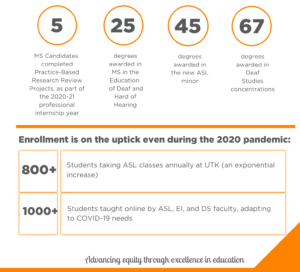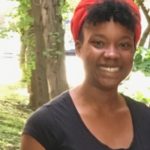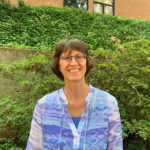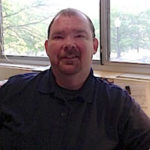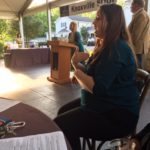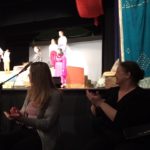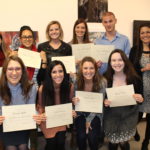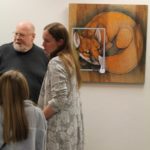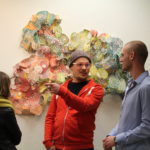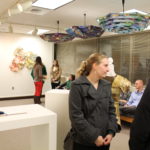TPTE has some pretty amazing teacher education programs and centers. Read more below for spotlights on just a few of them!
Spotlight on Deaf Studies
By the Numbers
Deaf Studies and American Sign Language education
We are excited to let our generous friends and alumni know that we now have our very own program and degree major name. We are no longer a concentration area under special education but are now collectively under the name of “Deaf Studies.” This change was made possible when we recognized a new need in K-12 programs and decided to establish a new undergraduate major along with a graduate teacher licensure program for American Sign Language education (ASL ed).
In 2017 the Tennessee legislature passed a law allowing high school students to take ASL to meet foreign language requirements. Additional legislation was passed in 2018 which requires institutions of higher education to allow ASL courses to satisfy foreign language requirements for admission to an undergraduate degree program. We anticipate the demand for qualified K-12 ASL teachers to grow over the next several years. Of course, there is still an ongoing demand for our current Deaf education and educational interpreting graduates.
With the assistance and endorsement of the University of Tennessee administration we were able to get approval from the Tennessee Higher Education Commission (THEC) this year for our new deaf studies ASL education major. With that approval we were also able to move our current degree programs in educational interpreting and deaf education under the banner of Deaf studies in the University of Tennessee, Knoxville (UTK) catalog. With your continued support, we hope to maintain our status as one of the premier deaf studies programs in the United States.
Embedding Social Justice in Teacher Preparation
- Gloshanda Lawyer
- Leala Holcomb
- Cheryl Shahan
- David Smith
One unique aspect of TPTE and the Deaf Studies program is our focus on social justice in education. Deaf Studies faculty members, Cheryl Shahan and David Smith, with former doctoral students, Gloshanda Lawyer and Leala Holcomb, published an article in the Odyssey magazine by the Laurent Clerc National Deaf Education Center. The article, “First Comes a Look at the Self: Integrating the Principles of Social Justice into a Teacher Preparation Program” shared a glimpse of how we include social justice into our teacher preparation program. We believe that educators, including Deaf education educators, “can be agents for bringing equity into the everyday lives of people at every level of society.” It is important for us to continually evaluate our social justice awareness, work collaboratively with others, incorporate social justice throughout the curriculum, recognize resistance, and especially be mindful that the process is ongoing and is a process of learning.
Educational Interpreting Student Menteeships
- Senior EI student interpreting at Knoxville Soup event
- Student with mentor interpreting at local theater event
- Students interpreting at Big Red Dog reading event
The educational interpreting program provides students numerous opportunities to work off campus with professional mentors. Over the last year students have worked with local schools, non-profit organizations and at special events held in the Knoxville area. Interpreting students provided needed services that enabled them to develop their skills while receiving feedback and support from certified interpreters and Deaf community members. Senior level interpreting students report that moving from the classroom into the community provides a true theory to practice experience.
Outreach to Local Deaf Business Owners
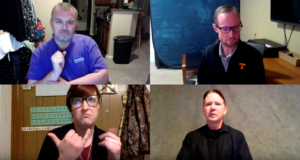 During the COVID-19 pandemic, the University of Tennessee, Knoxville (UTK) organization, ASL POP, (coordinated by ASL instructor, Calvin Farley) successfully hosted a panel of Deaf local business owners for an hour and a half. There were more than 150 UTK ASL students in attendance, along with several colleagues, instructors, and Deaf community allies. There was a total of 168 attendees. It went very well! There was an opportunity to listen, learn, and ask questions about the panel members’ backgrounds, experiences, and business management styles. The discussion was lively with 50+ different questions. Every question was answered in time, satisfying the attendees. Students were able to observe the conversation between the moderator and Deaf owners in ASL, while listening to an ASL to English voiced interpretation. This allowed students at various levels of ASL learning to gain full access to the discussion content while also seeing how to express business-related concepts in ASL.
During the COVID-19 pandemic, the University of Tennessee, Knoxville (UTK) organization, ASL POP, (coordinated by ASL instructor, Calvin Farley) successfully hosted a panel of Deaf local business owners for an hour and a half. There were more than 150 UTK ASL students in attendance, along with several colleagues, instructors, and Deaf community allies. There was a total of 168 attendees. It went very well! There was an opportunity to listen, learn, and ask questions about the panel members’ backgrounds, experiences, and business management styles. The discussion was lively with 50+ different questions. Every question was answered in time, satisfying the attendees. Students were able to observe the conversation between the moderator and Deaf owners in ASL, while listening to an ASL to English voiced interpretation. This allowed students at various levels of ASL learning to gain full access to the discussion content while also seeing how to express business-related concepts in ASL.
Large-Impact Research and Projects
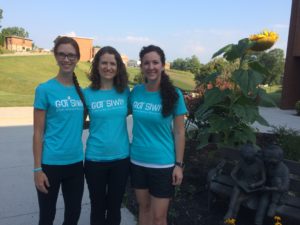
L-R: Jennifer Kilpatrick, University of North Florida, Kimberly Wolbers, University of Tennessee, and Hannah Dostal, University of Connecticut provide the first SIWI workshop of the project on the TSD campus, July 2017.
Kimberly Wolbers, professor of deaf studies, is currently directing a multi-year, nation-wide grant project focused on the evaluation of a writing instruction approach called Strategic and Interactive Writing Instruction (SIWI) implemented in grades 3-6. SIWI, conceptualized by Wolbers, aims to be responsive to the language needs of Deaf learners, whose language experiences are diverse and directly influence their writing. SIWI draws upon evidence-based approaches to teaching writing such as strategy instruction and collaborative, interactive writing. SIWI also contains language-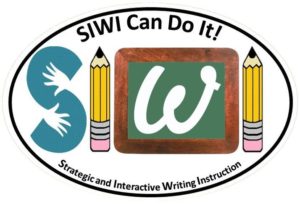 specific elements that provide teachers with direction on how to, for example, navigate between ASL and English when teaching developing bilinguals, or how to facilitate greater expressive language clarity and complexity among children with language delays. The purpose of the current project is to investigate the efficacy of the SIWI professional development program for improving the knowledge and instructional practices of teachers, as well as the impact of SIWI on the writing and language outcomes of Deaf students. There is a need to identify evidence-based literacy instruction tailored to the unique language of Deaf students, as well as programs that are effective at building teacher capacity.
specific elements that provide teachers with direction on how to, for example, navigate between ASL and English when teaching developing bilinguals, or how to facilitate greater expressive language clarity and complexity among children with language delays. The purpose of the current project is to investigate the efficacy of the SIWI professional development program for improving the knowledge and instructional practices of teachers, as well as the impact of SIWI on the writing and language outcomes of Deaf students. There is a need to identify evidence-based literacy instruction tailored to the unique language of Deaf students, as well as programs that are effective at building teacher capacity.
Addition of New Deaf Studies Faculty
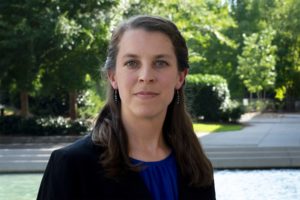 Kristen Secora PhD, CCC-SLP joined the faculty of the Deaf Studies teams at the University of Tennessee, Knoxville (UTK) in August of 2019. Her research focuses on language development and support for Deaf signing children and how to best support their hearing parents in communication with these kids. She is a licensed Speech-language pathologist and oversees the first three years of the undergraduate Audiology and Speech Pathology at UTK. One of the unique aspects of this program is that all students are required to take at least 2 semesters of ASL (many end up taking more). They are also required to take Foundations of Deaf Education where they learn about Deaf culture, audism, language modality options, and engage together with Deaf Education and Educational Interpreting majors about how best to support the language access and development for Deaf signing kids. This experience lays an important foundation for them as they continue on to graduate school to be leaders and advocates for ASL access for Deaf children.
Kristen Secora PhD, CCC-SLP joined the faculty of the Deaf Studies teams at the University of Tennessee, Knoxville (UTK) in August of 2019. Her research focuses on language development and support for Deaf signing children and how to best support their hearing parents in communication with these kids. She is a licensed Speech-language pathologist and oversees the first three years of the undergraduate Audiology and Speech Pathology at UTK. One of the unique aspects of this program is that all students are required to take at least 2 semesters of ASL (many end up taking more). They are also required to take Foundations of Deaf Education where they learn about Deaf culture, audism, language modality options, and engage together with Deaf Education and Educational Interpreting majors about how best to support the language access and development for Deaf signing kids. This experience lays an important foundation for them as they continue on to graduate school to be leaders and advocates for ASL access for Deaf children.
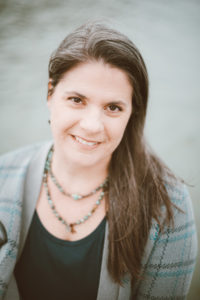 Megan Wylie Potts, MS, RID:NIC, joined the faculty on the Deaf Studies team at the University of Tennessee, Knoxville (UTK) in July 2020. She is teaching four elementary ASL courses and mentoring educational interpreting students. Megan has worked as a nationally certified ASL/English interpreter in Knoxville and surrounding areas for thirteen years. In 2017, Megan earned her Master of Science in interpreting pedagogy from the University of North Florida. Currently, Megan serves as the president of the Tennessee Registry of Interpreters for the Deaf (TRID), the statewide affiliate chapter of the Registry of Interpreters for the Deaf. In her role as TRID president, she serves on the Tennessee Council for the Deaf, DeafBlind, and Hard of Hearing. Her research interests include course sequencing in interpreter education programs, service learning in the social justice movement, and mentoring emerging and working interpreters.
Megan Wylie Potts, MS, RID:NIC, joined the faculty on the Deaf Studies team at the University of Tennessee, Knoxville (UTK) in July 2020. She is teaching four elementary ASL courses and mentoring educational interpreting students. Megan has worked as a nationally certified ASL/English interpreter in Knoxville and surrounding areas for thirteen years. In 2017, Megan earned her Master of Science in interpreting pedagogy from the University of North Florida. Currently, Megan serves as the president of the Tennessee Registry of Interpreters for the Deaf (TRID), the statewide affiliate chapter of the Registry of Interpreters for the Deaf. In her role as TRID president, she serves on the Tennessee Council for the Deaf, DeafBlind, and Hard of Hearing. Her research interests include course sequencing in interpreter education programs, service learning in the social justice movement, and mentoring emerging and working interpreters.
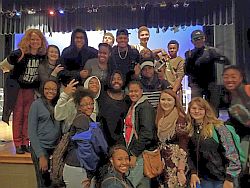
Professor and Director, Susan Groenke (top left) with CCYAL student participants
Spotlight on Center for Children’s and Young Adult Literature
Written by Anthony Pellegrino, associate professor of social science education.
For this “program highlight”, we go outside the typical Theory and Practice in Teacher Education (TPTE) programs, and focus on the Center for Children’s and Young Adult Literature (CCYAL). This center has emerged as a leader in scholarship in young adult literature research and practice in the nation. In this segment, we hear from TPTE Assistant Department Head, Susan Groenke, who is also the center’s Director and a professor of English education.
What’s the origin story of the CCYAL? Why was it established and what role has it filled in the department/field?
The CCYAL was established in 1999—in fact, this academic year (2019-2020) represents the center’s 20-year anniversary! In 1999, Jinx Watson, retired associate professor in the College of Communication and Information, and Ken Wise, professor, who is now in Special Collections in Hodges Library and is also co-director of the Great Smoky Mountains Regional Project, started the center to house a viewing collection of award-winning, high quality children’s and teen books. Jinx and Ken wanted to raise public awareness about the high-quality children’s picture books and books for youth published every year. They also wanted to bring authors to Knoxville for school visits and campus lectures.
We carry on these traditions today with a collection of about 5,000 recently published books that we maintain for public viewing. We establish relationships with book publishers—including small and little-known presses, to procure high quality books. When we receive new books, we spend a lot of time vetting them to ensure that we have the best books available to those who visit the center. We also host professional development workshops with local teachers and librarians so we can get the books off the shelves and into the hands of those who can turn kids on to reading. Finally, we also bring authors to Knoxville twice a year to visit local Title I, or high-poverty, schools. Because it is our 20th anniversary this year, we are kicking off a fundraising campaign to raise money to support an annual author-in residence program and an annual lecture series. Be on the lookout for news about ways you can support the center’s important work!
Does the CCYAL interface with the literacy doctoral program? If so how?
The PhD program in CCYAL was established in 2015 to offer graduate students opportunities to pursue deep study in the history, evolution, and current trends of children’s and young adult literature. Graduate students in the CCYAL program work as graduate assistants in the center, managing the center’s book collection; planning and implementing professional development (PD) workshops for local teachers and librarians; maintaining the center’s social media presence; and organizing author visits. The center is also home to The ALAN Review, a peer-reviewed (refereed) journal published by the Assembly on Literature for Adolescents of the National Council of Teachers of English (ALAN). It is devoted solely to the field of literature for young adults and is published three times per academic year (fall, winter, and summer). Graduate students in the PhD program serve as co-editors of The ALAN Review.
What have been some highlights of your work with the center?
Highlights for us include bringing authors to Knoxville and watching them meet with young people. We have hosted such award-winning writers as Rita Williams-Garcia, Jason Reynolds, and Kekla Magoon—all young adult (YA) authors who write important stories for young people. Jason Reynolds has such a powerful stage presence—he had over 200 students at Austin-East High School eating out of the palm of his hand when he visited! English teachers at West High School teach one of Kekla Magoon’s books—How It Went Down–to all their 10th grade students every year, so it was pretty neat to watch the students who had read her book get to meet her. Kekla led students through a readers’ theater and taught a writing workshop. She had all the students writing and sharing their poetry by the end of the day! It was a personal highlight for me to meet Rita Williams-Garcia, who wrote a beautiful YA novel called Like Sisters On the Homefront in the mid-1990s. I was a middle school language arts teacher then, and I remember giving that book to a reluctant reader who ended up loving the novel and asked for more books like that to read! I had the opportunity to share that story with Rita when she was here. Introducing her just made me feel like I had come full circle through my work with the center. Other highlights include meeting local teachers and librarians through our PD workshops who are excited to learn how to use high-quality children’s picture books in their content areas. We love watching teachers walk into the center–their eyes just light up when they see the books and know they are getting PD credit to “play with books” and learn how to integrate good books into their curriculum.
What kinds of projects (doctoral or specifically CCYAL) do you have coming up or are planning for in the future?
I am teaching a new advanced course in young adult literature for graduate students this fall. There are so many important trends and issues happening in the field right now, especially around diversity/(mis)representation in the genre, and the connections that exist among reading engagement, empathy, and socio-emotional learning. I decided to offer the course because I felt like students in our PhD program needed a space to more deeply consider these issues, how they might affect teacher preparation and our own ongoing research in the field.
We are also excited to host Alan Gratz, author of such YA books as Refugee, Grenade, Code of Honor (and many others) to Knoxville in October 2019. He will visit with beginning teachers on campus Oct. 23rd, and then will be out in local schools on Oct. 24th. We are also hoping to host the children’s book author, Alice Faye Duncan, who wrote the award-winning Martin, Memphis, and the Mountaintop (and many other fabulous books!) in spring 2020. Alice Faye Duncan graduated with an MLS in Library Science from the University of Tennessee, Knoxville in 1991, and is currently an elementary school librarian in Memphis, TN, as well as award-winning author!
We are also celebrating our 20th-year anniversary this academic year, so we are kick starting a fundraising campaign to support a new annual author-in-residence program and an annual author lecture series.
Please consider supporting CCYAL’s efforts to bring children’s and teen authors to UT and the Knoxville community.
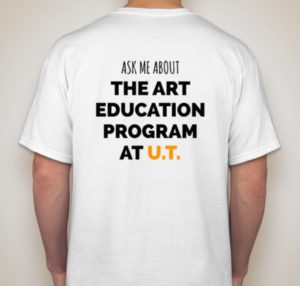 Art Education – Beyond Glitter and Glue
Art Education – Beyond Glitter and Glue
Written by Anthony Pellegrino, associate professor of social science education.
The art education program is housed in the department of Theory & Practice in Teacher Education (TPTE). Joy Bertling is an assistant professor of art education and serves as the program leader. In the past few years, she has worked to increase the visibility of the program through recruitment activities and community outreach. As part of those efforts, she has established important connections with faculty in the School of Art and worked closely with area schools in professional development and clinical practice.
We asked professor Bertling to share some information about the program and the experiences of the prospective art educators in it.
What are some typical backgrounds of the candidates you see the art education program?
Students admitte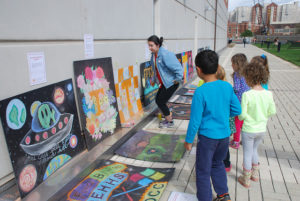 d into the art education program come from a variety of backgrounds. Approximately two-thirds of students pursue art education by completing the art education minor as undergraduates while completing their Bachelor of Fine Arts (BFA) in studio art. The other third represents students who decide to pursue art education after they have completed their bachelor’s degrees. These students may or may not have graduated with a major in studio art and usually have work experience in fields at least peripherally related to art or education, such as social work or graphic design. These students take the undergraduate prerequisites in studio art, art history, art education, and education before enrolling in the professional year along with the more traditional students.
d into the art education program come from a variety of backgrounds. Approximately two-thirds of students pursue art education by completing the art education minor as undergraduates while completing their Bachelor of Fine Arts (BFA) in studio art. The other third represents students who decide to pursue art education after they have completed their bachelor’s degrees. These students may or may not have graduated with a major in studio art and usually have work experience in fields at least peripherally related to art or education, such as social work or graphic design. These students take the undergraduate prerequisites in studio art, art history, art education, and education before enrolling in the professional year along with the more traditional students.
What courses and clinical experiences are included in the program?
The art education minor includes a practicum experience course, two art education methods courses, and other education courses. During the professional year, students complete a year-long internship and graduate coursework designed to lead toward a master’s degree. In ARED 530, art teacher candidates have the opportunity to engage in artmaking, which culminates in our annual art education intern juried art exhibition. The works from this year’s exhibit are currently on display in the College of Education, Health and Human Sciences dean’s suite.
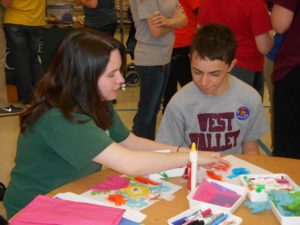 What do you hope your teacher candidates know and are able to do after completing the art education program?
What do you hope your teacher candidates know and are able to do after completing the art education program?
The art education program is designed to prepare students as artist-teachers and leaders in the field of art education. Graduates go on to serve in informal and formal educational settings, such as public and private schools, art museums, community centers, and other art agencies and institutions.
What is the current state of art in area schools?
From my experience, art teachers are in high demand in this area. Our graduates have high job placement rates. For instance, last year, all spring graduates secured full-time art teaching positions by May 1. After that date, I still had principals contacting me who were looking to fill open positions.
How does the art education program work with area schools and art teachers?
Clinical experiences are scaffolded throughout the program to prepare art teacher candidates for their future roles as art educators. In ARED 350, they observe two mentor teachers, one elementary and one secondary, and assist them in their classrooms. Then, in ARED 520, we work together with students in Inskip Elementary School’s summer program as we engage in place-based and community-based art education. The next semester, candidates begin their yearlong internship, which includes placements at elementary, middle, and secondary levels. Over the course of the internship, interns take on more responsibility in the classroom.
What are your plans for the program moving forward?
Our program has been active with our national and state professional organizations. For instance, we have a student chapter of the National Art Education Association. In recent years, our faculty, students, and alumni have received multiple awards from the Tennessee Art Education Association and faculty and students have served on the board of the state organization. However, I would like to see more students have opportunities to attend the state and national conferences associated with these organizations. I believe these early experiences of engaging in professional development as part of a wider learning community can be rewarding and establish patterns of professional participation that can span a career. I am currently working in my role as higher education division representative with the Tennessee Art Education Association to find ways so that conference registration can be free for pre-service teachers.

